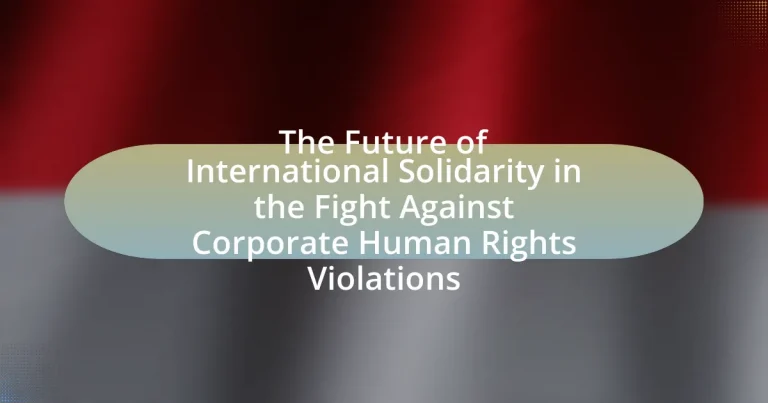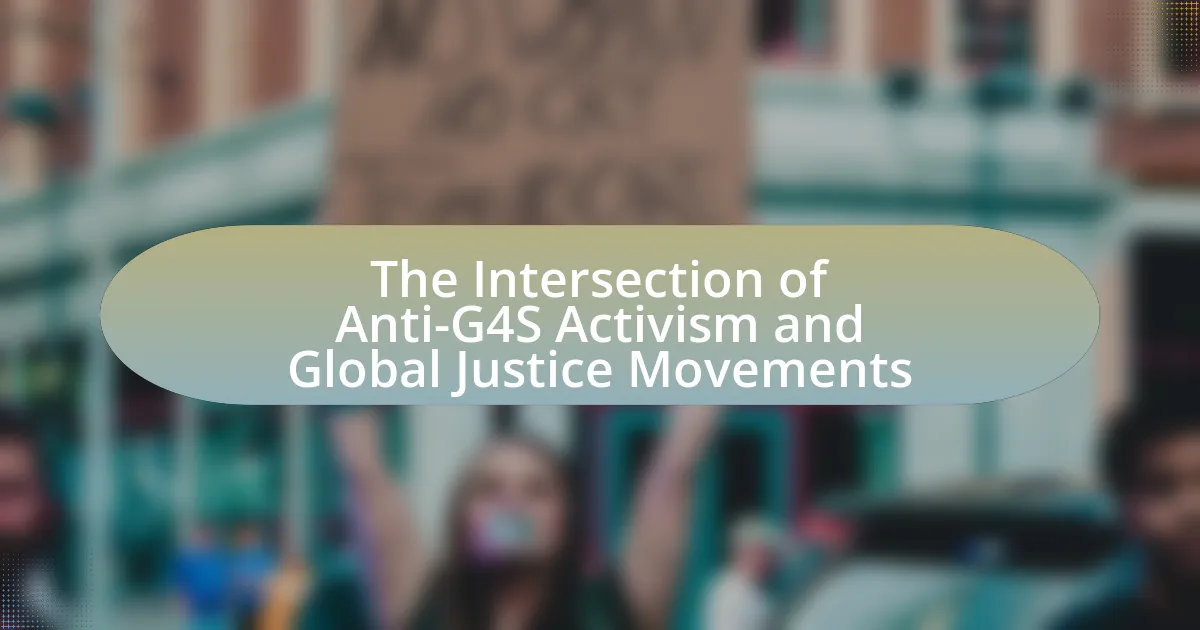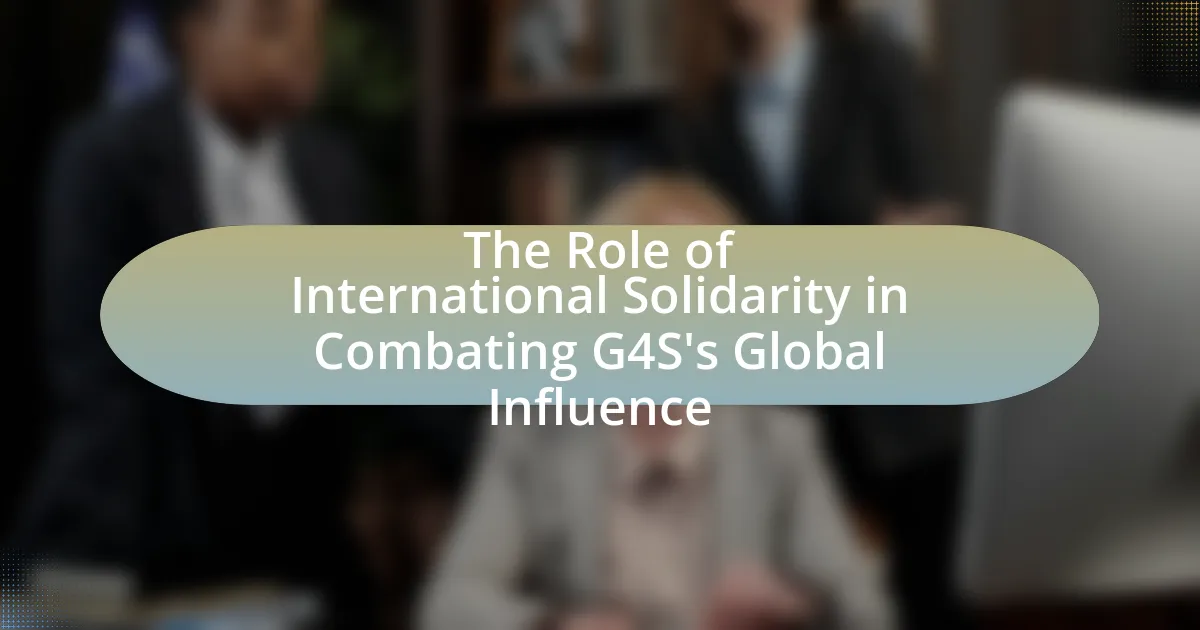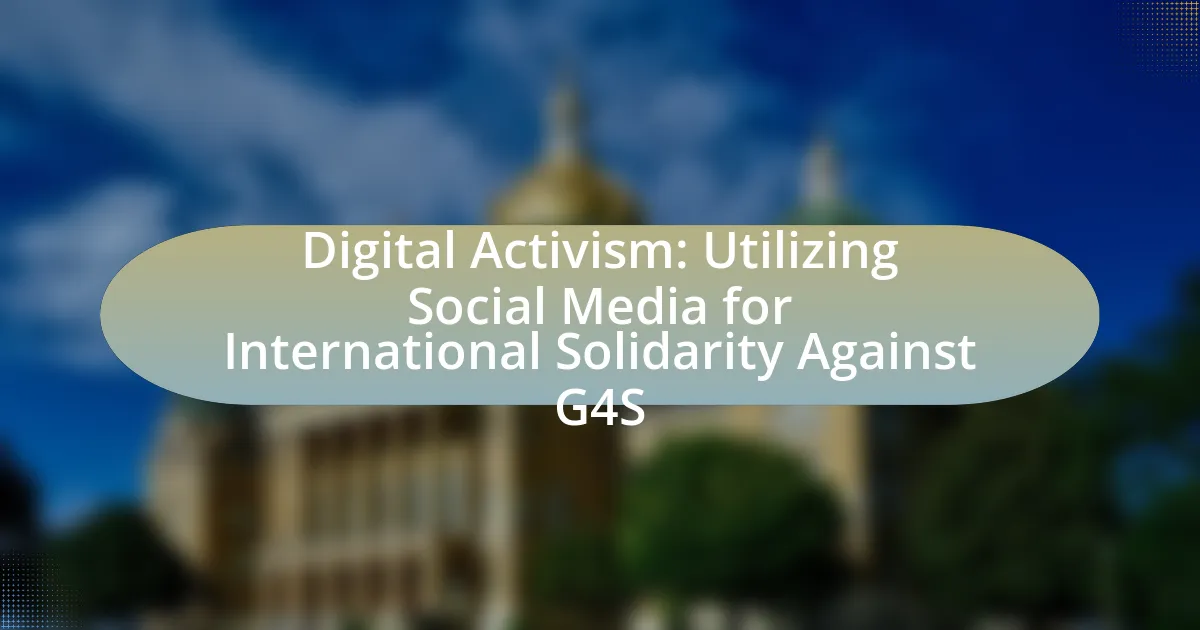The article examines the future of international solidarity in combating corporate human rights violations, emphasizing the importance of collaborative frameworks that enhance accountability and transparency. It highlights key initiatives such as the UN Guiding Principles on Business and Human Rights and the OECD Guidelines, which promote shared responsibility among states, businesses, and civil society. The discussion includes historical examples of successful solidarity movements, the challenges posed by differing national interests and laws, and the role of multinational corporations in complicating efforts. Additionally, it explores innovative strategies for enhancing solidarity, the impact of technology, and the essential partnerships needed to strengthen collective action against corporate abuses.
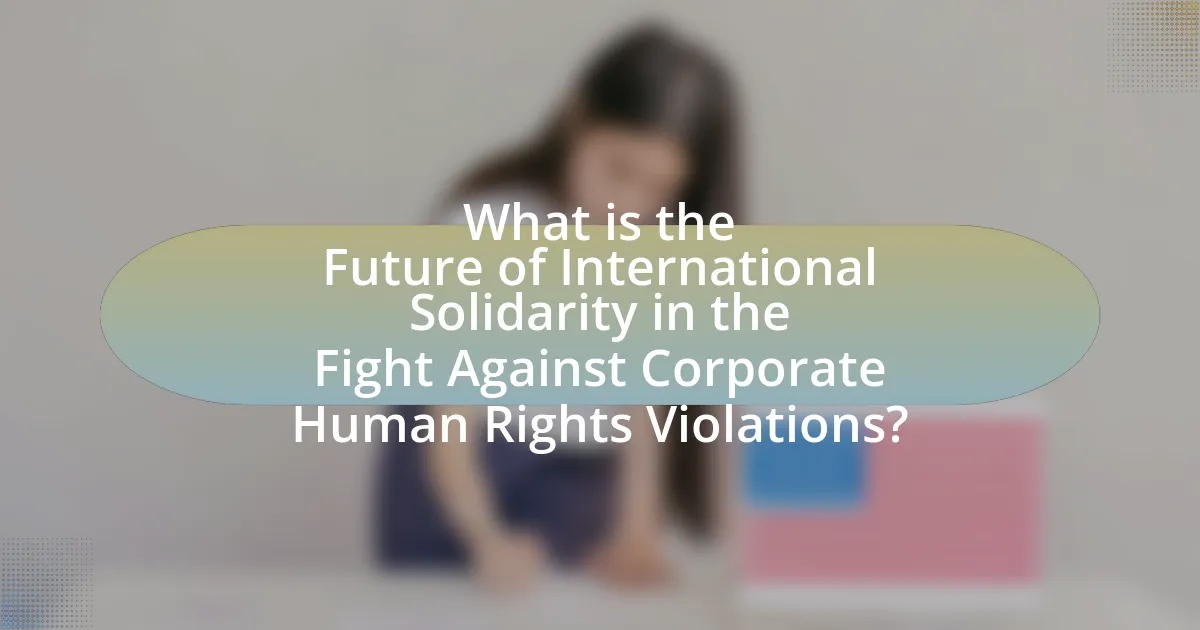
What is the Future of International Solidarity in the Fight Against Corporate Human Rights Violations?
The future of international solidarity in the fight against corporate human rights violations is increasingly focused on collaborative frameworks that enhance accountability and transparency. As global awareness of corporate misconduct grows, initiatives such as the UN Guiding Principles on Business and Human Rights and the OECD Guidelines for Multinational Enterprises are gaining traction, promoting shared responsibility among states, businesses, and civil society. Evidence of this shift can be seen in the rise of transnational advocacy networks and the implementation of legal mechanisms, such as the European Union’s proposed Corporate Sustainability Due Diligence Directive, which aims to hold companies accountable for human rights impacts throughout their supply chains. These developments indicate a strengthening of international solidarity, as stakeholders unite to combat corporate abuses and advocate for the protection of human rights globally.
Why is international solidarity important in addressing corporate human rights violations?
International solidarity is crucial in addressing corporate human rights violations because it fosters collective action and amplifies the voices of affected communities. When individuals and organizations across borders unite, they can exert greater pressure on corporations and governments to uphold human rights standards. For instance, the 2011 UN Guiding Principles on Business and Human Rights emphasize the role of states and businesses in preventing human rights abuses, highlighting that international cooperation can lead to more effective accountability mechanisms. Furthermore, campaigns like the global boycott of companies linked to human rights violations demonstrate how solidarity can mobilize public opinion and influence corporate behavior, ultimately leading to improved protections for vulnerable populations.
What historical examples illustrate the impact of international solidarity?
Historical examples illustrating the impact of international solidarity include the anti-apartheid movement in South Africa and the global response to the Syrian refugee crisis. The anti-apartheid movement, particularly during the 1980s, saw widespread international support, including economic sanctions and cultural boycotts against the South African government, which contributed to the eventual dismantling of apartheid in 1994. This solidarity was crucial in mobilizing global public opinion and pressuring governments to take action. Similarly, the Syrian refugee crisis prompted a significant international response, with countries and organizations providing humanitarian aid and resettlement programs, highlighting the collective effort to address human rights violations and support displaced populations. These examples demonstrate how international solidarity can effectively mobilize resources and influence political change in the face of human rights abuses.
How does international solidarity enhance the effectiveness of human rights advocacy?
International solidarity enhances the effectiveness of human rights advocacy by fostering a unified global response to human rights violations, which amplifies the voices of marginalized communities. When individuals and organizations across different countries collaborate, they can share resources, strategies, and information, creating a more powerful and coordinated effort against abuses. For instance, the global movement against apartheid in South Africa demonstrated how international solidarity can lead to significant political change, as countries imposed sanctions and mobilized public opinion to pressure the South African government. This collective action not only raises awareness but also holds violators accountable, making it harder for corporations and states to ignore human rights standards.
What are the key challenges facing international solidarity in this context?
Key challenges facing international solidarity in the fight against corporate human rights violations include differing national interests, lack of enforcement mechanisms, and varying levels of commitment to human rights standards. National interests often lead countries to prioritize economic benefits over human rights, undermining collective action. The absence of robust enforcement mechanisms makes it difficult to hold corporations accountable for violations, as seen in cases where companies exploit legal loopholes. Additionally, the inconsistency in commitment to international human rights standards among nations creates disparities in how violations are addressed, further complicating efforts for unified action.
How do differing national laws affect international cooperation?
Differing national laws significantly hinder international cooperation by creating legal inconsistencies that complicate cross-border collaboration. For instance, variations in labor laws, environmental regulations, and human rights protections can lead to conflicts when multinational corporations operate in multiple jurisdictions. These discrepancies may result in legal loopholes that companies exploit, undermining efforts to enforce human rights standards globally. A concrete example is the 2011 UN Guiding Principles on Business and Human Rights, which emphasize the need for consistent legal frameworks to hold corporations accountable. Without harmonization of laws, countries may struggle to coordinate actions against corporate violations, ultimately weakening international solidarity in addressing human rights abuses.
What role do multinational corporations play in complicating solidarity efforts?
Multinational corporations complicate solidarity efforts by prioritizing profit over ethical considerations, which often leads to human rights violations in various regions. Their vast resources and influence enable them to operate across borders, creating a power imbalance that undermines local communities’ ability to advocate for their rights. For instance, companies like Nestlé and Shell have faced criticism for exploiting labor and environmental resources in developing countries, which has sparked protests and calls for solidarity among affected communities. However, the corporations’ ability to shift operations and evade accountability diminishes the effectiveness of these solidarity movements, as they can easily relocate to jurisdictions with weaker regulations. This dynamic illustrates how multinational corporations can obstruct collective action aimed at addressing corporate human rights violations.
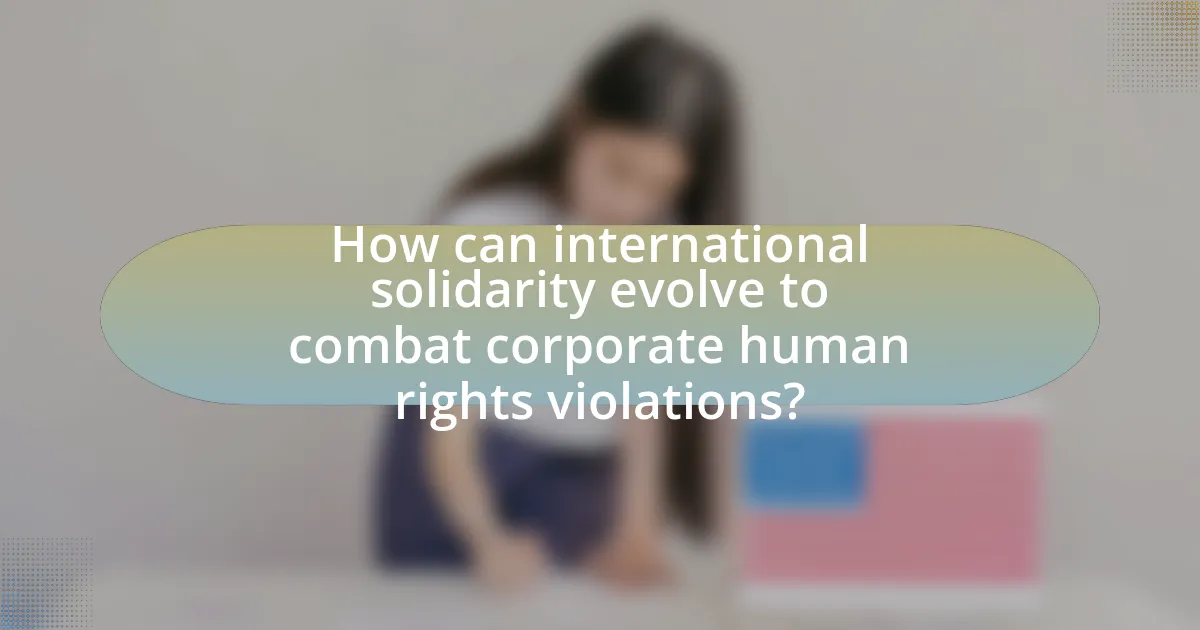
How can international solidarity evolve to combat corporate human rights violations?
International solidarity can evolve to combat corporate human rights violations by fostering global coalitions that hold corporations accountable through collective action and advocacy. These coalitions can unite various stakeholders, including non-governmental organizations, labor unions, and affected communities, to share resources, knowledge, and strategies for effective resistance. For instance, the 2011 UN Guiding Principles on Business and Human Rights emphasize the responsibility of businesses to respect human rights, and international solidarity can amplify these principles by pressuring governments and corporations to adhere to them. Furthermore, successful campaigns, such as the global boycott of companies linked to human rights abuses, demonstrate how coordinated efforts can lead to tangible changes in corporate behavior.
What innovative strategies are being proposed for enhancing solidarity?
Innovative strategies proposed for enhancing solidarity include the establishment of global coalitions that unite civil society organizations, labor unions, and grassroots movements to collectively address corporate human rights violations. These coalitions leverage shared resources and knowledge to amplify their impact, as evidenced by the success of the International Trade Union Confederation in mobilizing support for workers’ rights across borders. Additionally, the use of digital platforms for real-time information sharing and coordinated advocacy efforts has been highlighted as a crucial strategy, enabling rapid responses to emerging human rights issues. Research from the Global Network for Human Rights and the Environment indicates that such collaborative approaches significantly increase the effectiveness of solidarity actions, fostering a more unified front against corporate abuses.
How can technology facilitate international collaboration?
Technology facilitates international collaboration by providing platforms for real-time communication and information sharing across borders. Tools such as video conferencing, collaborative software, and social media enable individuals and organizations from different countries to work together efficiently, regardless of geographical barriers. For instance, during the COVID-19 pandemic, platforms like Zoom and Microsoft Teams became essential for global collaboration, allowing teams to maintain productivity and coordination despite physical distance. Additionally, cloud-based services enable the sharing of documents and resources instantaneously, fostering a collaborative environment that enhances collective efforts in addressing issues like corporate human rights violations.
What role do grassroots movements play in shaping future strategies?
Grassroots movements play a crucial role in shaping future strategies by mobilizing community engagement and influencing policy changes. These movements often arise from local concerns and empower individuals to advocate for their rights, thereby creating a collective voice that can challenge corporate practices. For instance, the global response to the 2013 Rana Plaza disaster in Bangladesh led to increased awareness and the establishment of the Accord on Fire and Building Safety, demonstrating how grassroots activism can lead to significant reforms in corporate accountability. Such movements not only raise awareness but also pressure governments and corporations to adopt more ethical practices, thereby shaping the strategic landscape for future human rights initiatives.
What partnerships are essential for strengthening international solidarity?
Essential partnerships for strengthening international solidarity include collaborations between governments, non-governmental organizations (NGOs), and international institutions. These partnerships facilitate the sharing of resources, knowledge, and strategies to combat corporate human rights violations effectively. For instance, the United Nations Guiding Principles on Business and Human Rights emphasize the role of multi-stakeholder initiatives that bring together states, businesses, and civil society to promote accountability and protect human rights. Additionally, alliances between local grassroots organizations and global advocacy groups enhance the capacity to address human rights abuses by amplifying marginalized voices and ensuring that local contexts inform international standards.
How can NGOs and civil society organizations collaborate effectively?
NGOs and civil society organizations can collaborate effectively by establishing clear communication channels and shared objectives. This collaboration can be enhanced through joint initiatives, resource sharing, and coordinated advocacy efforts. For instance, the International Federation of Red Cross and Red Crescent Societies has successfully partnered with local NGOs to address humanitarian crises, demonstrating that aligned goals and mutual support lead to greater impact. Additionally, research from the Global Partnership for Effective Development Cooperation indicates that collaborative frameworks improve project outcomes by leveraging diverse expertise and networks.
What is the role of international organizations in fostering solidarity?
International organizations play a crucial role in fostering solidarity by facilitating cooperation among nations to address global challenges, including corporate human rights violations. They provide platforms for dialogue, establish norms and standards, and mobilize resources to support affected communities. For instance, the United Nations has developed frameworks like the Guiding Principles on Business and Human Rights, which encourage states and businesses to uphold human rights standards. Additionally, organizations such as Amnesty International and Human Rights Watch advocate for accountability and transparency, thereby strengthening collective action against corporate abuses. These efforts demonstrate how international organizations can unite diverse stakeholders in the pursuit of justice and human rights protection.
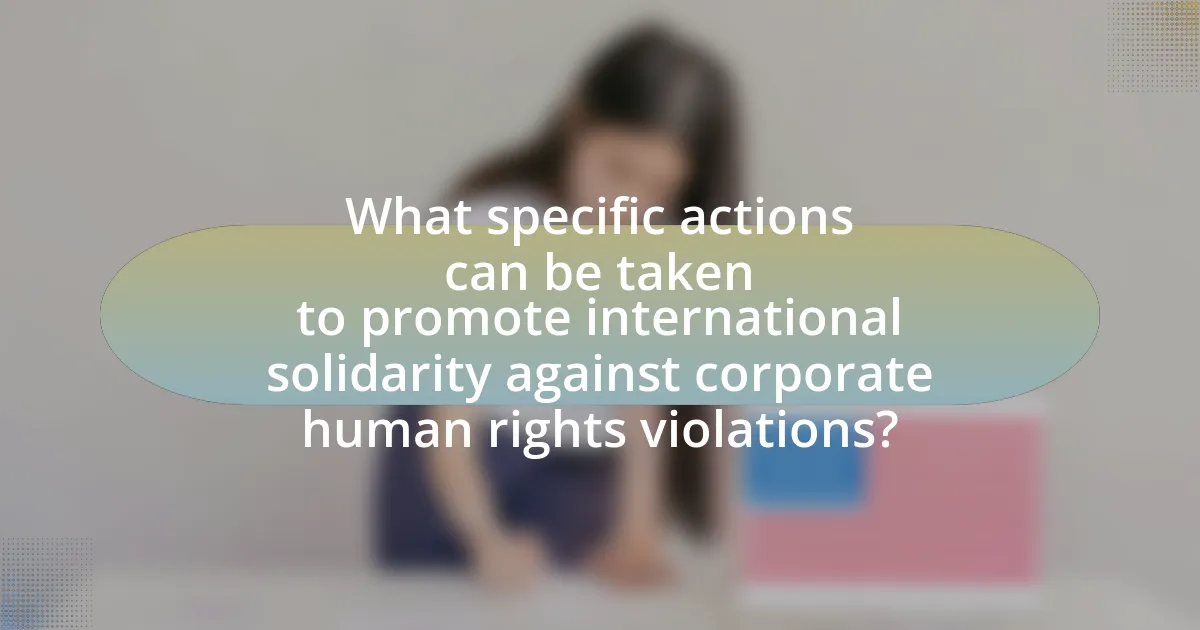
What specific actions can be taken to promote international solidarity against corporate human rights violations?
To promote international solidarity against corporate human rights violations, stakeholders can engage in coordinated advocacy efforts, such as forming global coalitions that unite NGOs, labor unions, and affected communities. These coalitions can amplify voices, share resources, and create a unified front to pressure corporations and governments to uphold human rights standards. For instance, the 2011 UN Guiding Principles on Business and Human Rights provide a framework for accountability, encouraging states to enforce regulations that hold corporations responsible for their actions. Additionally, public awareness campaigns can educate consumers about corporate practices, leading to boycotts and increased demand for ethical business practices. Such actions have been shown to influence corporate behavior, as seen in the successful campaigns against companies like Nestlé and their practices in developing countries.
What best practices can organizations adopt to enhance their impact?
Organizations can enhance their impact by implementing transparent reporting practices, engaging stakeholders, and fostering collaboration across sectors. Transparent reporting allows organizations to communicate their goals, progress, and challenges, which builds trust and accountability. Engaging stakeholders, including affected communities and advocacy groups, ensures that diverse perspectives inform decision-making and strategy development. Collaboration with other organizations, governments, and businesses can amplify efforts and resources, leading to more effective advocacy against corporate human rights violations. For instance, the UN Guiding Principles on Business and Human Rights emphasize the importance of multi-stakeholder engagement in addressing human rights impacts, demonstrating that collective action can lead to significant improvements in corporate accountability.
How can advocacy campaigns be designed to maximize international support?
Advocacy campaigns can be designed to maximize international support by employing strategic messaging, leveraging social media, and building coalitions with diverse stakeholders. Strategic messaging ensures that the campaign resonates with global audiences by framing issues in relatable terms, such as human rights and social justice, which are universally recognized values. Leveraging social media platforms allows campaigns to reach a wider audience quickly, facilitating viral sharing and engagement; for instance, campaigns like #MeToo gained international traction through effective online mobilization. Building coalitions with NGOs, grassroots organizations, and influential figures enhances credibility and amplifies the campaign’s reach, as seen in the successful collaboration of various groups during the global climate strikes. These methods collectively create a robust framework for garnering international support for advocacy efforts.
What role does public awareness play in driving solidarity efforts?
Public awareness is crucial in driving solidarity efforts by mobilizing collective action and fostering a sense of shared responsibility among individuals and communities. When the public is informed about corporate human rights violations, it can lead to increased pressure on companies to change their practices, as seen in campaigns like the boycott of Nestlé over its marketing of infant formula in developing countries. This awareness not only encourages consumers to make ethical choices but also inspires grassroots movements and advocacy groups to unite in their efforts, amplifying their impact. Research indicates that heightened public awareness correlates with greater participation in solidarity initiatives, as demonstrated by the rise of social media campaigns that have successfully raised awareness and funds for various human rights causes.
How can individuals contribute to the fight against corporate human rights violations?
Individuals can contribute to the fight against corporate human rights violations by advocating for ethical consumerism and supporting companies that prioritize human rights. By choosing to purchase products from businesses that demonstrate a commitment to fair labor practices and environmental sustainability, individuals can influence corporate behavior. Research indicates that consumer preferences can drive companies to adopt more responsible practices; for instance, a 2020 study by the Global Sustainability Institute found that 66% of consumers are willing to pay more for sustainable brands. Additionally, individuals can participate in campaigns, sign petitions, and engage in social media activism to raise awareness about corporate abuses, thereby pressuring companies to improve their practices.
What actions can consumers take to support ethical practices?
Consumers can support ethical practices by choosing to purchase products from companies that demonstrate a commitment to social responsibility and ethical sourcing. This includes researching brands to ensure they adhere to fair labor practices, environmentally sustainable methods, and transparent supply chains. For instance, a 2020 survey by Nielsen found that 66% of global consumers are willing to pay more for sustainable brands, indicating a strong market preference for ethical practices. Additionally, consumers can advocate for change by participating in campaigns that promote corporate accountability and by supporting legislation aimed at protecting human rights in business operations.
How can individuals engage with local and global movements?
Individuals can engage with local and global movements by participating in advocacy, volunteering, and raising awareness about human rights issues. Advocacy can involve joining or supporting organizations that focus on corporate accountability, such as Amnesty International or Human Rights Watch, which actively campaign against human rights violations. Volunteering for local NGOs or community groups that address these issues allows individuals to contribute directly to efforts aimed at promoting justice and accountability. Additionally, raising awareness through social media platforms can amplify the message and mobilize others, as evidenced by the global reach of campaigns like #MeToo and #BlackLivesMatter, which have successfully highlighted systemic injustices and garnered widespread support.
What are the future trends in international solidarity against corporate human rights violations?
Future trends in international solidarity against corporate human rights violations include increased collaboration among civil society organizations, enhanced legal frameworks, and greater consumer awareness. Civil society organizations are likely to form stronger coalitions to advocate for corporate accountability, as seen in initiatives like the UN Guiding Principles on Business and Human Rights, which encourage multi-stakeholder engagement. Legal frameworks are expected to evolve, with countries implementing stricter regulations on corporate conduct, such as mandatory human rights due diligence laws, which have already been adopted in nations like France and Germany. Additionally, consumer awareness is rising, driven by social media and advocacy campaigns, prompting businesses to adopt ethical practices to maintain their reputations. These trends indicate a growing momentum for collective action against corporate human rights violations on a global scale.
How might global political changes impact solidarity efforts?
Global political changes can significantly impact solidarity efforts by altering the landscape of international cooperation and advocacy. For instance, shifts in government policies, such as the rise of nationalist movements, can lead to reduced support for transnational solidarity initiatives, as seen in countries that prioritize domestic over global issues. Additionally, changes in international relations, such as trade agreements or sanctions, can either facilitate or hinder collaborative efforts against corporate human rights violations. Historical examples include the impact of the 2008 financial crisis, which led to increased scrutiny of corporate practices and fostered solidarity movements advocating for human rights protections. Thus, the dynamics of global politics directly influence the effectiveness and scope of solidarity efforts in addressing corporate human rights violations.
What emerging issues should solidarity movements be prepared to address?
Solidarity movements should be prepared to address the increasing prevalence of corporate human rights violations exacerbated by globalization and technological advancements. As multinational corporations expand their reach, they often exploit labor and environmental regulations in developing countries, leading to significant human rights abuses. For instance, the International Labour Organization reported that over 25 million people are victims of forced labor globally, highlighting the urgent need for solidarity movements to advocate for stronger protections and accountability measures. Additionally, the rise of digital surveillance and data privacy concerns poses new challenges, as corporations may infringe on individual rights under the guise of security and efficiency. Addressing these issues requires solidarity movements to adapt their strategies and collaborate across borders to ensure that human rights are upheld in the face of corporate power.
